
Myristicin
The psychoactive molecule in nutmegs,
and the story of the nut that changed the world.

Paul May
University of Bristol, UK

Molecule of the Month August 2014
Also available: HTML version.

|
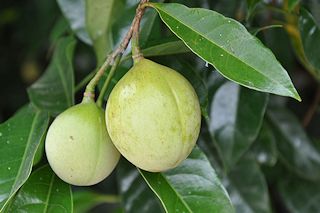
Nutmegs growing on a tree.
[Photo: Joe Ravi. Creative Commons license CC-BY-SA 3.0]
|
There’s a psychoactive drug in nutmeg?
Yes, two actually. The first is called myristicin (named after the nutmeg tree Myristica fragrans) of which nutmeg is the seed. (In fact this is the only tree which is the source of two separate spices, since it also provides the spice mace). Myristicin is found in small quantities in nutmeg oil and in even smaller amounts in other spices such as dill and parsley. It is an anticholinergic drug, which means it suppresses the action of the neurotransmitter acetylcholine, preventing certain nerves from firing.
What does that do?
The nerves that are blocked are those responsible for controlling the movement of muscles present in the gut, urinary tract, lungs, and other parts of the body. If they are working incorrectly, this can lead to disorders such as gastritis, diarrhoea, cystitis, asthma, bronchitis, etc.. Thus, preventing the nerves firing can alleviate the symptoms of some of these ailments. Indeed, many folk remedies recommend taking nutmeg oil for nausea, stomach upsets, indigestion, or even toothache. Although none of these ‘remedies’ are medically proven, nutmeg oil is used in some cough syrups and as a natural food flavouring in baked goods, beverages (e.g. Coca Cola) and sweets.
But it’s psychoactive?
Nutmeg oil isn’t (much), but other extracts of nutmeg which contain myristicin are, which has made scientists believe that another compound plays a key role. The second psychoactive ingredient in nutmeg is elemicin. Eating the two compounds together is thought to be far more potent than either one alone. Elemicin has been used as a precursor to synthesise mescaline (see MOTM for Oct 1999), while myristicin is the traditional precursor for making the psychedelic drug MMDA. Indeed, there are reports that myristicin might be converted in the liver to MMDA, which is why it’s psychoactive, although these have yet to be proven.
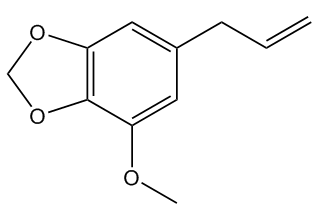 |
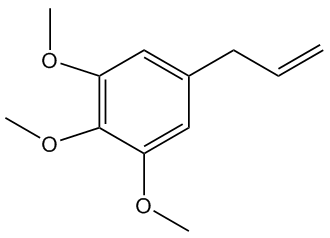 |
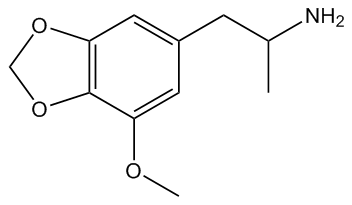 |
Myristicin |
Elemicin |
3-methoxy-4,5-methylenedioxyamphetamine (MMDA) |
|
|
|
What are its effects?
Luckily, when used in cooking the dosages are far too small to have any effects. But if taken in high doses the effects take several hours to appear but then it can produce hallucinations, visual distortions and paranoia, with the person exhibiting a confused, excited state, together with headaches, nausea and memory loss. And these effects can last several days!
Is it dangerous?
Too much of anything can be lethal, and the same is true of nutmeg. There are several reports of nutmeg poisoning, mainly due to people overdosing while trying to get ‘high’. Symptoms include exaggerated versions of those described above, plus a few extras, such as vomiting, collapse, tachycardia (racing heart-rate) and irrational behaviour.
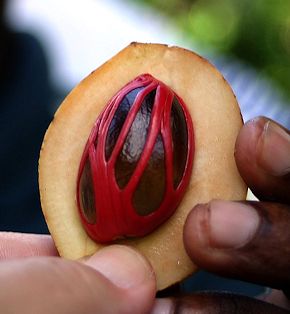
The nutmeg nut, surrounded by the red fibres of mace.
[Photo: Brocken Inaglory. Creative Commons license CC-BY-SA 3.0]
|
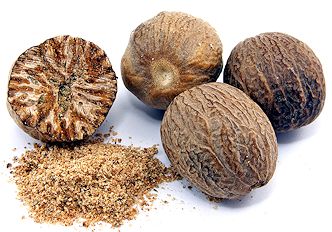
Nutmegs and grated nutmeg powder.
|
So why did nutmeg change the history of the world?
In the Elizabethan days, nutmeg and mace were more valuable than gold by weight, as they were believed (incorrectly) to be a cure for the bubonic plague that was devastating populations across Europe at that time. Mace was also prized as a preservative for meat. Furthermore, until the 17th century, most of the cooking in northern Europe was fairly bland and tasteless (some argue it still is!). But when explorers started charting new countries, like North and South America, Africa, India, and South-East Asia, they discovered a range of exotic herbs and spices (chilli, cinnamon, cassia, cardamom, ginger, black pepper, and turmeric) which could be added to food to provide some much-needed flavour to pep-up European cuisine. Indeed, the prices people were willing to pay for these spices became so great that enormous profits could be made by the trading companies that could find them and bring them back.
And nutmeg was one of them?
Nutmeg was actually one of the most lucrative spices and was imported into Europe via Venice by Muslim traders. They had traded in nutmeg for hundreds of years (and it even features in the story of Sinbad the Sailor in the One Thousand and One Nights), but they never revealed where they obtained it from. This was because until the mid-19th century the small island of Run in Indonesia was the world's only source of nutmeg and mace, and the knowledge of its exact location was a carefully guarded secret. However, the secret was revealed in 1511, when a Portuguese explorer discovered the island and its nutmeg trees, and the Portuguese took over the nutmeg trade for a brief period. However, it wasn’t long before the two main sea-powers in the region at this time, the British East India Company and the Dutch East India Company, both fought the Portuguese, and then each other, for control of the island, leading to two bitter and bloody Anglo-Dutch wars.
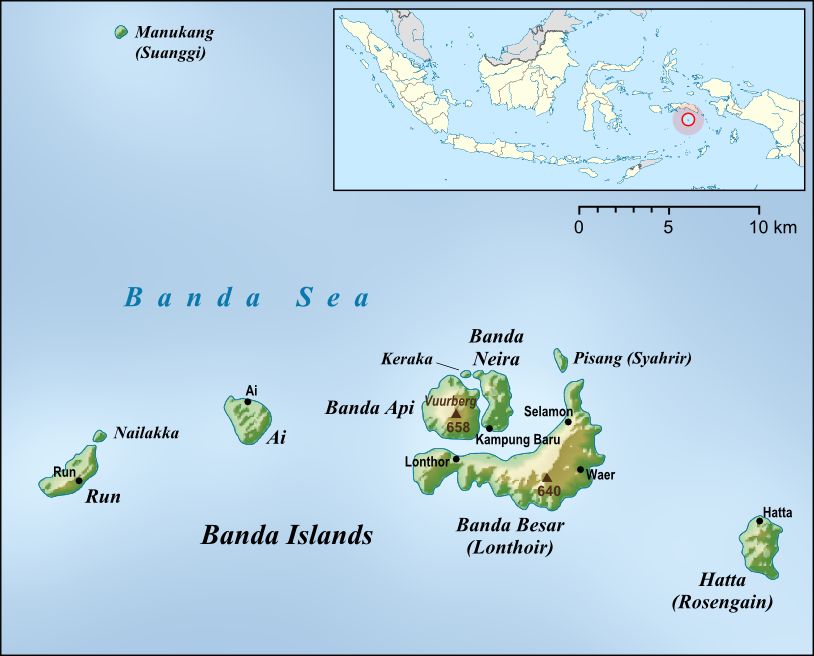
Run Island in Indonesia.
[Author: Lencer. Creative Commons license CC BY-SA 3.0]
Who won?
Well, that depends on your point of view. To end the fighting, a treaty was devised in 1664 which allowed the Dutch to retain control of Run Island and the other Banda Islands, in return for the Dutch ceding their far-off and generally useless colony in Manhattan Island in America called New Amsterdam to the British. This could be the most important land-swap in all history, because the British immediately renamed their new colony New York, which rapidly grew into one of the biggest cities in the fledgling USA. This now meant that most of the colonies in Northern America were controlled by the British (apart from a few areas in Canada and Louisiana which were occupied by French settlers), and they imposed their culture, legal system and language on the whole continent, and on the new immigrants arriving through New York. So, without nutmeg, America might not be a single country, and English might not be the dominant world language!
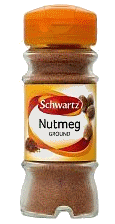 What happened to Run Island?
What happened to Run Island?
The Dutch retained a monopoly on nutmeg for another 150 years until the British managed to gain control of the main Banda island Banda Besar in 1817, and transplant its nutmeg seeds to Ceylon, Grenada, Singapore and other British colonies. This virtually destroyed the value of the Banda islands to the Dutch. With the monopoly broken, the price of nutmeg and other spices plummeted, and soon Europeans could sprinkle these once-precious spices onto their food with no thought to their cost. Nowadays, nutmeg is now just another spice on the spice-rack, and people have forgotten its historical and chemical dark side.
Bibliography
- G. Hahn, H. Wassmuth, Ber. Deut. Chem. Ges. (A and B) 67 (1934) 696. (Synthesis of mescaline from elemicin)
- N. Leela, Chemistry of Spices (Calicut, Kerala, India, Biddles Ltd. 2008).
- A. McKenna, S.P. Nordt, J. Ryan, Euro. J. of Emer. Med. 11 (2004) 240. (Nutmeg poisoning)
- A.T. Shulgin, T. Sargent, C. Naranjo, Psychopharm. Bull. 4 (1967) 13. (Chemistry and Psychopharmacology of Nutmeg)
- A. Weil, Bull. on Narcotics (UNODC) (1966) 15. (Use of nutmeg as a psychotropic agent)
- E.Y. Williams, F. West, J. Nat. Med. Assoc. 60 (1968): 289. (Use of nutmeg as a psychotropic drug)
- M.C. Ricklefs, A History of Modern Indonesia since c.1300, 2nd Edition.(London, MacMillan, 1993) (The story of Run Island)
- AboutAsianHistory.com
- A. Dalby, Dangerous Tastes: The Story of Spices, British Museum Press, 2000.
- G. Milton, Nathaniel's Nutmeg: How One Man's Courage Changed the Course of History, Hodder & Stoughton, 1999.
- J. Turner, Spice: The History of a Temptation, HarperCollins, 2004.


 Back to Molecule of the Month page.
Back to Molecule of the Month page.
![]()
![]()
![]()
![]()







 What happened to Run Island?
What happened to Run Island?